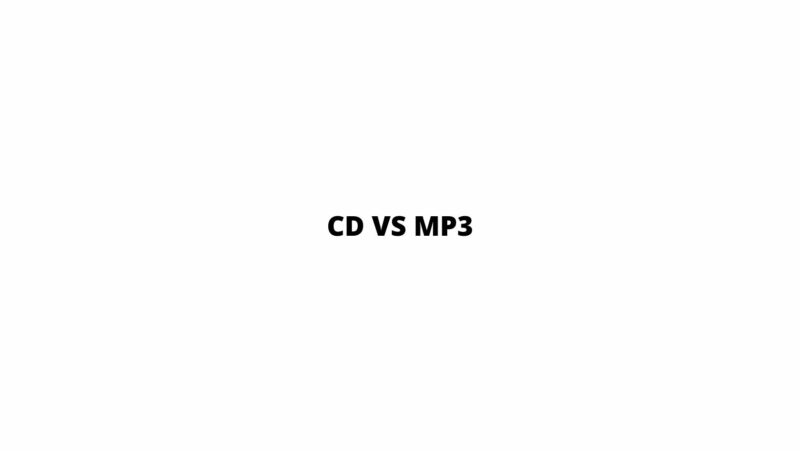In the realm of audio consumption, two formats have become emblematic of distinct eras: the Compact Disc (CD) and the MP3 file. The CD, a relic of the analog-digital crossover, symbolizes pristine audio quality, while the MP3, a pioneer of digital compression, has redefined music portability. This article embarks on a comprehensive journey, dissecting the attributes of both formats and delving into the nuances of CD and MP3 audio quality. As technology and listening preferences continue to evolve, the aim is to decipher which format truly strikes the chords of auditory excellence.
The Compact Disc (CD) Unveiled
The CD, introduced in the early 1980s, revolutionized audio consumption by offering pristine audio quality in a digital format. Its allure is rooted in several key attributes:
- Uncompressed Fidelity: CDs store audio in an uncompressed format, preserving every sonic detail captured during recording. This lossless nature appeals to audiophiles and music enthusiasts who prioritize audio fidelity.
- Bit Depth and Sample Rate: CDs feature a bit depth of 16 bits and a sample rate of 44.1 kHz. This combination captures a wide range of frequencies and nuances, ensuring accurate representation of the original sound.
- Dynamic Range and Clarity: The 16-bit depth provides a wide dynamic range that allows for the faithful representation of both delicate nuances and powerful crescendos. This contributes to a clear and detailed auditory experience.
The MP3 Revolution
The MP3 format, developed in the 1990s, marked a shift towards digital compression. MP3s introduced a new era of music portability and accessibility, with attributes such as:
- Lossy Compression: MP3s use lossy compression algorithms to reduce file sizes by discarding audio data that is less perceptible to the human ear. This enables the storage of a large number of songs in a relatively small space.
- Bitrates: MP3s offer various bitrates that dictate the level of audio compression. Higher bitrates generally result in better audio quality but also larger file sizes.
- Portability and Convenience: MP3s ushered in a new era of music portability, enabling listeners to carry vast collections of music on devices as small as a pocket.
Comparing Audio Quality
The debate over CD vs MP3 audio quality hinges on several factors:
- Compression and Sound Fidelity: CDs preserve audio fidelity due to their uncompressed nature. MP3s, on the other hand, involve data loss due to lossy compression. This can lead to artifacts, reduced dynamic range, and compromised sound quality, especially at lower bitrates.
- Bitrates and Perceptibility: MP3 audio quality is directly influenced by the chosen bitrate. Lower bitrates sacrifice audio quality for smaller file sizes, potentially resulting in noticeable compression artifacts. Higher bitrates can approach CD quality but result in larger files.
- Listening Environment: The impact of compression artifacts might be more pronounced in high-fidelity audio setups, where listeners are attuned to subtleties.
- Subjective Perception: Audio quality assessment is subjective. Some listeners might discern the differences between CD and MP3 quality, while others may find the distinctions less pronounced, especially in everyday listening scenarios.
Music Genre and Impact
The choice between CD and MP3 audio quality can be influenced by the type of music being listened to:
- Complex Music: Complex genres, such as classical or orchestral music, with intricate layering and dynamic ranges, might benefit from CD audio quality to preserve their richness.
- Pop and Rock: Genres with less intricate arrangements might not suffer as much from the audio compression of MP3s, making them suitable for casual listening.
Storage and Accessibility
The MP3 format’s key advantage lies in its storage efficiency and accessibility:
- Vast Libraries: MP3s enable users to carry extensive music collections in a small storage space, making them ideal for portable devices.
- Streaming Services: The advent of streaming services has shifted the landscape further, allowing users to access a vast library of songs without the need for local storage.
Audiophile and Casual Listener Perspectives
Audiophiles, who prioritize audio quality and sonic nuances, often favor CDs due to their uncompressed nature. They might find MP3 audio quality lacking, especially in critical listening scenarios. Casual listeners, on the other hand, might find MP3s more than satisfactory for day-to-day listening due to their convenience and storage efficiency.
Conclusion
The comparison between CD and MP3 audio quality delves into a realm where nostalgia and modern convenience intersect. CDs, with their uncompressed audio, represent an era of audio purity cherished by audiophiles. In contrast, MP3s ushered in an era of portability and accessibility, catering to the evolving needs of music consumers.
While CDs boast superior audio quality due to their lossless nature, MP3s offer unparalleled convenience and storage efficiency. The choice between CD and MP3 audio quality depends on individual priorities—whether one values the richness and authenticity of CD audio or the convenience and portability of MP3s. As technology continues to advance, the audio landscape evolves, giving rise to new formats and experiences that strive to strike the right balance between audio quality and accessibility.


